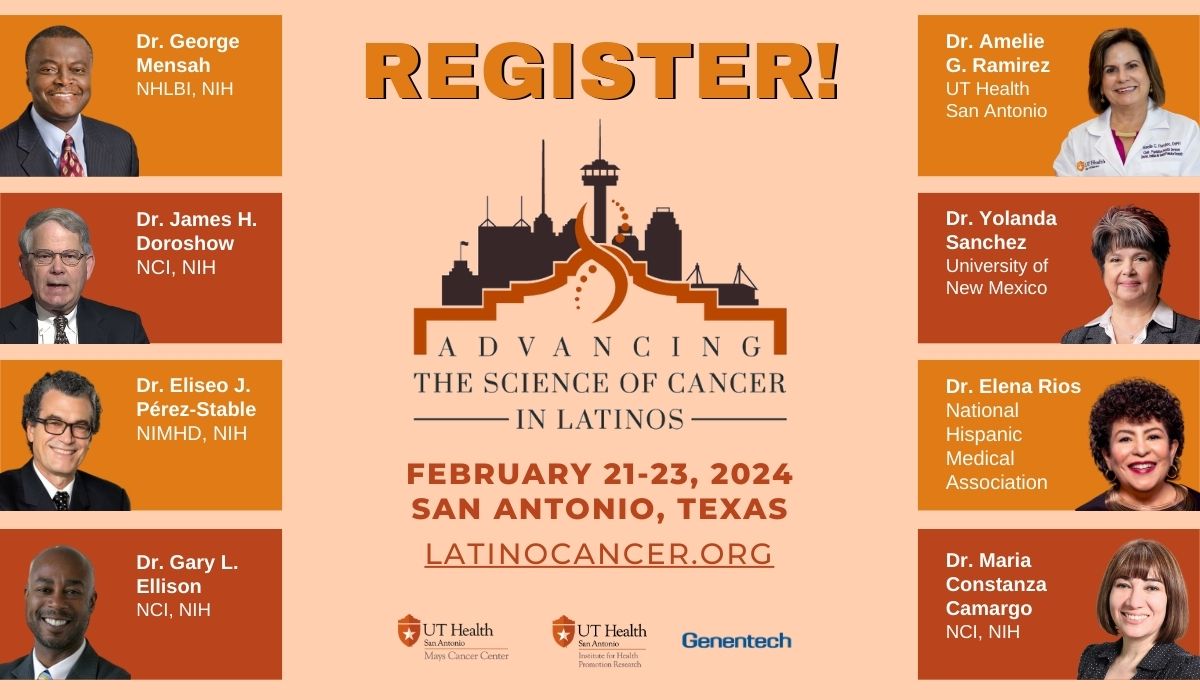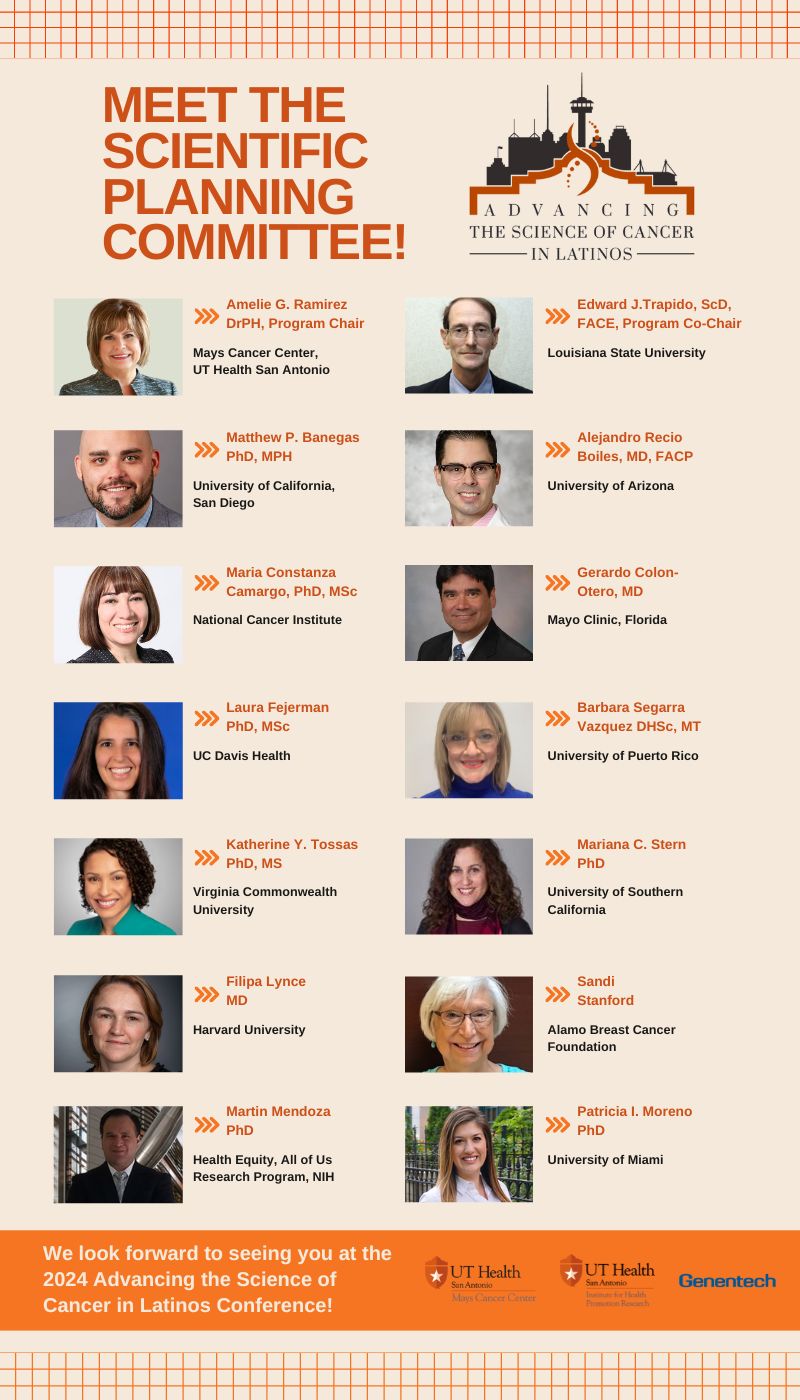Share On Social!
Did you know Latinos are expected to face a 142% rise in cancer cases in coming years?
To address the heavy burden of Latino cancer, you can register now for UT Health San Antonio’s 4th biennial Advancing the Science of Cancer in Latinos conference Feb. 21-23, 2024, at the Marriott Riverwalk in San Antonio, Texas.
The conference will welcome researchers, physicians, community leaders, patient advocates, policymakers, and students from across the country to tackle Latino cancer from prevention to treatment to survivorship.
“Advancing the Science of Cancer in Latinos is a sanctuary where we can share research, experience, and action to translate basic research into clinical best practices, effective community interventions, and professional training programs to eliminate cancer disparities in Latinos,” said Dr. Amelie Ramirez, who directs the Institute for Health Promotion Research (IHPR) and Salud America! program at UT Health San Antonio. The IHPR will co-host the conference with the NCI-designated Mays Cancer Center.
Here are five reasons you should register now for the conference!
1. Unite for a Common Cause: Tackling Latino Cancer!
Since 2018, The Advancing the Science of Cancer in Latinos biennial conference series has attracted over 800 researchers and featured over 200 research posters with innovations in Latino cancer research, education, and training since.
View the conference proceedings from 2018, 2020, and 2022 for details.
For 2024, the conference will provide space for promoting equitable care and research that can bridge the health disparity gaps that plague Latinos.
“We have made a lot of strides in health equity, but there are still so many disparities in Latino cancer prevention, community development, cancer research and Latino survivorship,” Ramirez said.
2. Learn from Amazing Guest Speakers!
The 2024 Advancing the Science of Cancer in Latinos conference has a stellar speaker lineup.
Dr. Eliseo J. Pérez-Stable, National Institute on Minority Health and Health Disparities at the National Institutes of Health. He will focus on individual- and system-level solutions to address inequities experienced by Latinos across the cancer care continuum.
 Dr. Gary L. Ellison, National Cancer Institute. He will explore how natural disasters are disrupting cancer screening, diagnosis, and treatment, especially for Latinos.
Dr. Gary L. Ellison, National Cancer Institute. He will explore how natural disasters are disrupting cancer screening, diagnosis, and treatment, especially for Latinos.
Dr. George Mensah, National Heart, Lung, and Blood Institute. He will explore translational research to reduce heart disease.
Dr. Yolanda Sanchez, University of New Mexico. She will talk about reducing the Latino cancer burden via transdisciplinary research from the University of New Mexico Comprehensive Cancer Center, and present her unique viewpoint as the first Latina to lead an NCI-designated Comprehensive Cancer Center.
“I am excited to make connections, build collaborations, and learn new methods to help us take big strides in tackling Latino cancer from all angles, from the lab to the community,” Ramirez said
Check out the agenda to see all the speakers!
3. Meet the World-Renowned Scientific Planning Committee!
 The 2024 Advancing the Science of Cancer in Latinos conference has a deep commitment to addressing the health inequities that are driving cancer disparities.
The 2024 Advancing the Science of Cancer in Latinos conference has a deep commitment to addressing the health inequities that are driving cancer disparities.
The committee has many experts in cancer health disparities. Members were selected by their diverse educational backgrounds, expertise in different areas of cancer health disparities research, and experience organizing other conferences.
The committee is led by co-chairs Amelie G. Ramirez, DrPH, UT Health San Antonio, and Edward J. Trapido, ScD, FACE, Louisiana State University.
The rest of the committee includes:
- Barbara Segarra Vasquez, DHSc, MT, University of Puerto Rico
- Alejandro Recio Boiles, MD, FACP, University of Arizona
- Maria Constanza Camargo, National Cancer Institute
- Filipa C. Lynce, MD, Harvard University
- Gerardo Colon-Otero, MD, Mayo Clinic, Florida
- Katherine Y. Tossas, PhD, MS, Virginia Commonwealth University
- Laura Fejerman, PhD, MSc, UC Davis, California
- Mariana C. Stern, PhD, University of Southern California
- Martin Mendoza, PhD, Director of Health Equity for the All of Us Research Program
- Matthew P. Banegas, PhD, MPH, University of California, San Diego
- Patricia I. Moreno, PhD, University of Miami
- Sandi Stanford, Alamo Breast Cancer Foundation
Platinum conference sponsors include Amgen, Bristol Myers Squibb, Genentech, and Gilead. Amigos of the conference include Arizona Comprehensive Cancer Center, Center for Health Equity Education Research, UC San Diego Moores Cancer Center, and VCU Massey Cancer Center.
You can also meet Dr. Amelie Ramirez, who conducts research and interventions to reduce Latino cancer disparities. These include Quitxt, the Avanzando Caminos study. clinical trial diversity supported by Genentech, a member of the Roche Group, and the Avanzando Equidad de Salud: Latino Cancer Health Equity Research Center supported by the American Cancer Society.
“We aim to help reduce the risks for South Texans in developing cancer and improving their quality of life should they be diagnosed with cancer,” Ramirez said.
4. Confront the Health Inequities Behind Latino Cancer Health Disparities!
We can’t talk about Latino cancer without addressing health inequities.
Latino and low-income families face worse health outcomes because they are disproportionately burdened by substandard schools, poor housing, unsafe streets, costly transportation, unequal pay, nutrient-poor food, adverse childhood experiences, and more.
These burdens are not random, unique, or situational.
Rather, these burdens are common, structural, and rooted in discriminatory practices and policies.
“To make long-lasting changes in promoting health equity for our nation, we need to move beyond individualist thinking and toward structural thinking that addresses systemic inequities in the social and environmental conditions in which live, learn, work and play,” Ramirez said. “A constant theme for the 2024 Advancing the Science of Cancer in Latinos conference will be how to address the inequities that lead to cancer outcomes and health equity,” Ramirez said.
5. Discover Historic San Antonio (and the Riverwalk)!
The 2024 Advancing the Science of Cancer in Latinos conference will take place deep in the heart of Texas.
 San Antonio’s bold culture and historic legacies make it a perfect gateway. As you explore the city, from the Alamo to the Mission churches, the rich culture only grows stronger.
San Antonio’s bold culture and historic legacies make it a perfect gateway. As you explore the city, from the Alamo to the Mission churches, the rich culture only grows stronger.
Diverse cuisines, including famed Tex-Mex, fill the air with rich aromas. Music flourishes: country-western bands, mariachis, folk singers, conjunto—all singing the songs of the city. Art comes alive with river gardens, Spanish colonial architecture and esteemed museums.
However, nothing personifies San Antonio more than the people with their intimate and welcoming nature.
Make sure to visit to famous San Antonio Riverwalk!
By The Numbers
142
Percent
Expected rise in Latino cancer cases in coming years



